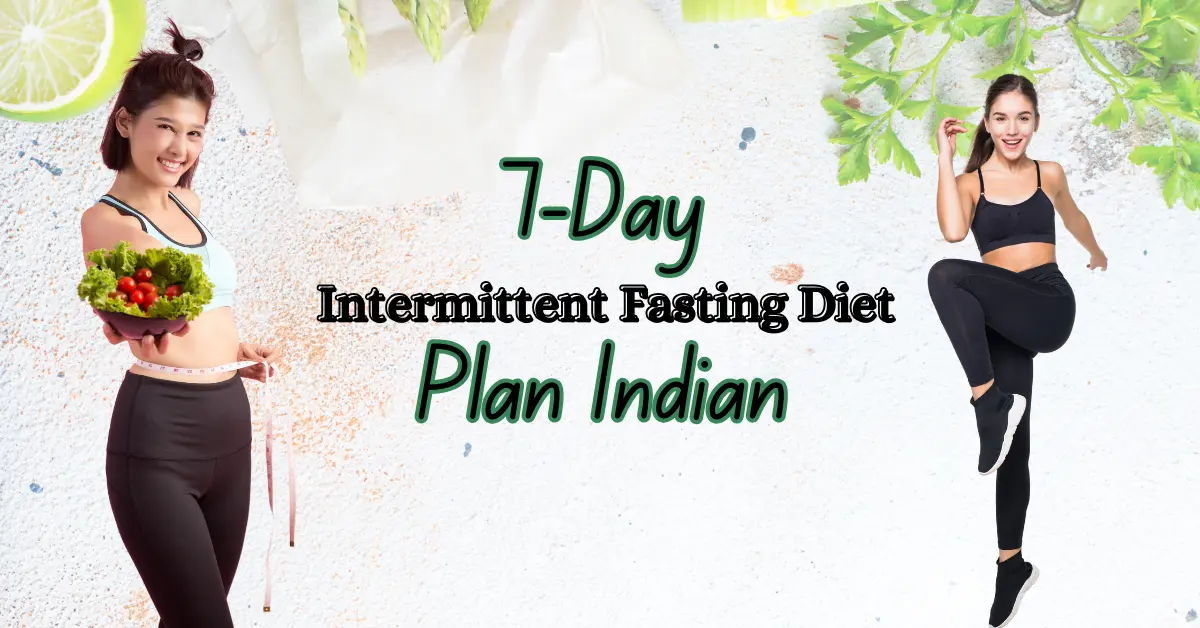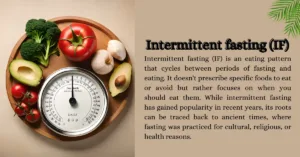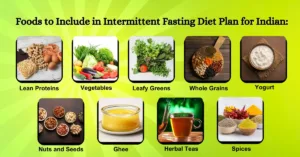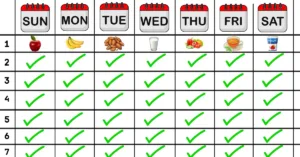
Intermittent fasting diet plan india
Intermittent fasting is recognized for its efficacy in weight loss and enhancing metabolic health. An Indian intermittent fasting diet plan can assist in achieving nutritional goals. The 16/8 plan is prevalent ( The 16/8 plan involves fasting for 16 hours each day and restricting eating to an 8-hour window. For example, one might fast from 8:00 PM to 12:00 PM the next day, then consume meals between 12:00 PM and 8:00 PM.) ; know more about it and access a 7-day meal plan for intermittent fasting below.
Intermittent fasting (IF)
Intermittent fasting, or IF, is gaining popularity for its potential health and weight loss benefits. It involves alternating between periods of fasting and eating, during which calorie intake is restricted. The emphasis lies on the timing of your meals rather than the content of your meals. This eating pattern has garnered attention for its simplicity and effectiveness in improving metabolic health and aiding weight loss.
The 7-Day Intermittent Fasting Diet Plan Indian is good for your body because it gives you healthy meals from Indian food. It helps your body work better, manage weight, and follow fasting easily. Eating balanced meals at the right times, keeps you healthy and happy, fitting with Indian tastes and traditions.
Benefits of IF (Intermittent Fasting)
Intermittent fasting offers various health perks, promoting both physical and mental well-being. Here’s a rundown of its benefits:
Weight Loss: By reducing calorie intake and utilizing stored fat for energy, intermittent fasting aids in shedding pounds. It also helps in managing calorie intake, facilitating weight management.
Improved Insulin Sensitivity: Intermittent fasting enhances the body’s ability to regulate glucose, thereby lowering the risk of type 2 diabetes and assisting in its management.
Heart Health: Intermittent fasting decreases blood pressure, LDL cholesterol, and triglyceride levels, thereby reducing the risk of heart disease.
Cellular Repair: It triggers autophagy, a process that eliminates damaged cells, promoting cellular repair and potentially extending lifespan.
Inflammation Reduction: Intermittent fasting lowers inflammatory markers in the body, reducing the risk of chronic diseases like heart disease and cancer.
Brain Health: Intermittent fasting boosts brain function, aiding in neuron generation and offering protection against neurodegenerative diseases like Alzheimer’s and Parkinson’s.
Mood Enhancement: Intermittent fasting may improve mood and alleviate symptoms of depression and anxiety, although the exact mechanisms are not fully understood.
Foods to Include in Intermittent Fasting Diet Plan for Indian
When practicing intermittent fasting, it’s crucial to opt for filling foods that provide essential nutrients. Here’s a selection of Indian foods to include in your intermittent fasting diet plan:
- Lean Proteins: Include chicken, fish, and paneer (cottage cheese) to maintain muscle mass and keep you feeling full.
- Lentils and Pulses: Opt for moong dal, masoor dal, and chana dal for plant-based protein and fiber, promoting satiety and digestion.
- Vegetables: Incorporate spinach, cauliflower, and bhindi (okra) for low-calorie, high-fiber options rich in essential nutrients.
- Leafy Greens: Choose methi (fenugreek leaves) and palak (spinach) for their nutrient density and vital vitamins and minerals.
- Whole Grains: Enjoy brown rice and whole wheat flour roti (chapati) for complex carbohydrates and fiber, providing sustained energy and fullness.
- Yogurt: Opt for plain yogurt (unsweetened) for its high protein and probiotics, supporting gut health and appetite control.
- Nuts and Seeds: Include almonds, walnuts, and flax seeds for their healthy fats, protein, and fiber, promoting prolonged satiety.
- Ghee (Clarified Butter): Use ghee in moderation for flavor and healthy fats, being mindful of its calorie density.
- Herbal Teas: Enjoy tulsi (holy basil) tea and ginger tea for hydration and hunger suppression, with potential health benefits.
- Spices: Enhance flavor with turmeric, cumin, coriander, and cinnamon, which add taste without extra calories and may offer health perks.
7-Day Intermittent Fasting Diet Plan Indian
Here’s the 7-day intermittent fasting diet plan tailored for Indian cuisine, following a 16/8 intermittent fasting schedule:
Day 1
- 12:00 PM – Lunch: Grilled chicken breast with mixed vegetables or vegetable salad, roti, and dal.
- 3:00 PM – Snack: Greek yogurt with honey.
- 7:00 PM – Dinner: Lentil soup with brown rice.
Day 2
- 12:00 PM – Lunch: Tofu and vegetable stir-fry with quinoa.
- 3:00 PM – Snack: Handful of almonds and walnuts.
- 7:00 PM – Dinner: Grilled fish with sautéed spinach or spinach and paneer stir-fry.
Day 3
- 12:00 PM – Lunch: Chickpea salad with cucumber, tomatoes, and lemon-tahini dressing or mixed vegetable sabzi with roti.
- 3:00 PM – Snack: Sliced carrots and bell peppers with hummus.
- 7:00 PM – Dinner: Paneer curry with brown rice.
Day 4
- 12:00 PM – Lunch: Mixed vegetable curry with whole-grain roti.
- 3:00 PM – Snack: Apple or pear.
- 7:00 PM – Dinner: Grilled chicken with steamed broccoli or palak and rice.
Day 5
- 12:00 PM – Lunch: Brown rice with lentil soup and stir-fried greens.
- 3:00 PM – Snack: Roasted chana or makhana.
- 7:00 PM – Dinner: Tofu or paneer tikka with cucumber and tomato salad.
Day 6
- 12:00 PM – Lunch: Spinach and mushroom omelet with whole-grain toast.
- 3:00 PM – Snack: Mixed berries.
- 7:00 PM – Dinner: Baked fish with sautéed asparagus or lentil and vegetable stew.
Day 7
- 12:00 PM – Lunch: Quinoa salad with roasted vegetables and tahini dressing.
- 3:00 PM – Snack: A slice or a piece of dark chocolate or milk chocolate.
- 7:00 PM – Dinner: Grilled chicken or tofu with mixed greens.
Tips To Follow
Effectively adhering to a 7-day Indian diet plan for intermittent fasting requires meticulous planning and commitment. Here are some pointers to assist you in staying focused:
- Choose the Right Intermittent Fasting Method: Select an approach that suits your lifestyle and preferences.
- Meal Preparation: Prepare meals and snacks in advance to avoid unhealthy choices when hungry and pressed for time.
- Include Fiber: Incorporate fiber-rich foods like vegetables, fruits, and whole grains to promote fullness and satisfaction during fasting.
- Nutrient Balance: Ensure meals contain a balance of carbohydrates, proteins, and healthy fats to meet your nutritional needs.
- Track The Progress: Keep a journal to record meals, fasting periods, and any health or weight fluctuations, helping to identify what suits you best.
- Maintain Consistency: Consistently adhere to your fasting schedule to maximize benefits and establish a routine.
- Listen to Your Own Body: Listen to your body’s signals of hunger and fullness. Adjust your schedule if genuinely hungry outside of your eating window.
Navigating the Challenges in Intermittent Fasting
Intermittent fasting offers numerous benefits, yet it also presents challenges. To optimize your intermittent fasting journey, consider these issues and solutions:
Hunger and Cravings: Initially, you may experience hunger and cravings during fasting periods, which can be challenging but tend to diminish with time.
- Solution: Keep hydrated with water, tea, or black coffee. Consume fiber and protein-rich foods during your eating window to promote satiety.
Energy Levels: Some individuals may feel a lack of energy, particularly in the early stages of intermittent fasting, impacting daily activities and exercise.
- Solution: Allow your body time to adapt, as energy levels typically normalize after a few days to weeks. Schedule workouts during your eating window for an energy boost.
Nutrient Deficiency: Poorly planned intermittent fasting can result in nutrient deficiencies due to fewer opportunities to consume essential vitamins and minerals.
- Solution: Prioritize nutrient-dense foods during your eating window, including a variety of fruits, vegetables, lean proteins, and whole grains to meet your nutritional requirements.
Overeating During Eating Window: Some individuals may overeat during their eating window, counteracting weight loss efforts.
- Solution: Practice portion control and mindful eating during your meal window. Listen to your body’s hunger cues and stop eating when satisfied, not overly full.
Stress and Mood: Intermittent fasting may occasionally lead to increased stress or mood swings, affecting overall well-being.
- Solution: Implement stress-reduction techniques such as meditation, yoga, or deep breathing exercises. If intermittent fasting negatively impacts mental health, reconsider its suitability for you.
NOTE
This 7-day Indian intermittent fasting diet plan offers a solid starting point. Adapt it to suit your preferences and heed your body’s signals. Note that intermittent fasting may not be appropriate for all individuals. Before going on any new diet regimen, seek advice from a local medical specialist to ensure it aligns with your health needs and goals.
Conclusion
In summary, the 7-day Indian intermittent fasting diet plan offers a practical and effective approach to improving health and well-being. By following this plan, individuals can enjoy a variety of nutritious meals while harnessing the benefits of intermittent fasting for weight loss and metabolic health. It’s important to listen to the body, stay hydrated, and adjust meals as needed. Consulting with a healthcare professional before starting any new dietary regimen is advisable. With dedication and consistency, this plan can pave the way for a healthier lifestyle and a brighter future.
So, take the first step towards a healthier you today by incorporating this 7-day Indian intermittent fasting diet plan into your life. With dedication and consistency, you’ll soon get to know the countless benefits of intermittent fasting and pave the way for a happier, healthier future.
FAQs
1. What is Intermittent fasting and its need?
Intermittent fasting involves alternating between eating and fasting periods as an eating pattern. Rather than focusing on what you eat, it’s more about when you eat. This approach doesn’t restrict specific foods but instead dictates when you should eat them.
2. Suggest some of the most suited intermittent fasting diet plans for only Indians.
For Indians, the most suitable intermittent fasting diet plan is often the 16/8 method. This includes fasting for 16 hours and consuming all meals within an 8-hour window daily. This plan aligns well with traditional Indian meal timings and allows for flexibility in incorporating culturally relevant foods. Additionally, it’s important to prioritize nutrient-dense foods during the eating window to ensure adequate nourishment.
3. What is the primary recommended intermittent fasting diet plan for 7 days (vegetarians)?
For a 7-day intermittent fasting plan, vegetarian options include meals like vegetable stir-fry with tofu, lentil soup, chickpea salad, and grilled paneer with vegetables, ensuring balanced nutrition and satisfaction.
4. What is the primary recommended intermittent fasting diet plan for 7 days (nonvegetarians)?
For a 7-day intermittent fasting plan, non-vegetarian options include meals like grilled chicken with mixed vegetables, salmon with quinoa, turkey wrap, and beef stir-fry, providing protein-rich and balanced nutrition.
5. Is intermittent fasting recommended for everyone?
Intermittent fasting may not be suitable for pregnant or breastfeeding women, individuals with eating disorders or certain medical conditions like diabetes, those taking specific medications, children and adolescents, and those with a history of nutrient deficiencies. Consultation with a healthcare provider is recommended before starting intermittent fasting.
Also Read:
7 Easy Mediterranean Diet Breakfast Recipes You Should Try
References:
https://pubmed.ncbi.nlm.nih.gov/36082888/
https://www.ncbi.nlm.nih.gov/pmc/articles/PMC7021351/
https://www.ncbi.nlm.nih.gov/pmc/articles/PMC5959807/






